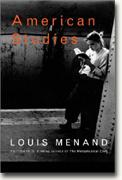American Studies
Louis Menand
book reviews:
· general fiction
· chick lit/romance
· sci-fi/fantasy
· graphic novels
· nonfiction
· audio books
· author interviews
· children's books @
curledupkids.com
· DVD reviews @
curledupdvd.com
newsletter
win books
buy online
links
home
for authors
& publishers
for reviewers

 |
American Studies Louis Menand Farrar, Straus & Giroux Hardcover 304 pages November 2002 |
|
Given the vague title, the cover photo of a young woman intensely reading at an otherwise empty New York subway station and Menand essays published in The New Yorker, American Studies could have been a book of general interest essays and observations. The book’s first essays, however, are quite specific and somewhat obscure: a contribution to a discussion about a possibly fictitious episode in William James’ life whose significance has been hotly discussed by earlier biographers; the principles behind Oliver Wendell Holmes’ decisions as judge. Certainly well-written and succinctly argued – but more the reflections of a modern, tolerant academic than general reading material.
Which essays will grab the individual reader will vary according to one’s reading predilections. But if you’re an avid close reader, if various texts of the past 50 years mean a lot to you in your daily life (e.g., the magazine institution The New Yorker or Norman Mailer or rock criticism at Rolling Stone or understanding Al Gore’s character), you’ll find essays among the 15 of 10-20 pages length that make you sit up and say, ‘Wow, he’s right. I never thought of it that way.’ At both The New Yorker and Rolling Stone, Menard shows us where the editorial and business staff of necessity had to cross paths (after all, both are for-profit enterprises), though the writers prefer to deny it. Taking the film The People vs. Larry Flynt, Menard shows us how Jerry Falwell and Flynt actually belong to the same world: "Larry Flynt put the shame back into sex. Jerry Falwell was on the same mission, and the parallel is less superficial than it may sound. ... They acquire their definitions from each other, and what is fascinating about them is not that they ended up in court together, but that they arose together, they fell together, and their worlds constantly interpenetrated one another – were, at bottom, the same world." If these examples have piqued your interest, you’ll learn many eye-opening things about 20th century America here and find your own personal favorites among the essays.
|
|
|
|
 Click here to learn more about this month's sponsor! |
|
| fiction · sf/f · comic books · nonfiction · audio newsletter · free book contest · buy books online review index · links · · authors & publishers reviewers |
|
| site by ELBO Computing Resources, Inc. | |
 And then your reviewer got hooked: how can one best read Richard Wright? Having tried Native Son and Black Boy, clearly important books though difficult and long-winded, Menand’s essay here provided a whole new vantage point. In "The Long Shadow of James B. Conant," you read about a Harvard president with influential ideas about what a liberal arts education should consist of (e.g., a ‘great books’ curriculum) and on the decision Truman made to drop the atom bomb. There is a link in Conant’s intellectual development between these events, and as Menand lays bare the inherent assumptions we learn how one prominent man’s thinking was a typical set of beliefs for his time. In a short review of a biography of William Paley, head of CBS for many decades, we get a compressed history of TV: "The development of American television had almost nothing to do with technology. Network television was no more natural or inevitable than any of the other empires that locked the cold war world into place."
And then your reviewer got hooked: how can one best read Richard Wright? Having tried Native Son and Black Boy, clearly important books though difficult and long-winded, Menand’s essay here provided a whole new vantage point. In "The Long Shadow of James B. Conant," you read about a Harvard president with influential ideas about what a liberal arts education should consist of (e.g., a ‘great books’ curriculum) and on the decision Truman made to drop the atom bomb. There is a link in Conant’s intellectual development between these events, and as Menand lays bare the inherent assumptions we learn how one prominent man’s thinking was a typical set of beliefs for his time. In a short review of a biography of William Paley, head of CBS for many decades, we get a compressed history of TV: "The development of American television had almost nothing to do with technology. Network television was no more natural or inevitable than any of the other empires that locked the cold war world into place."